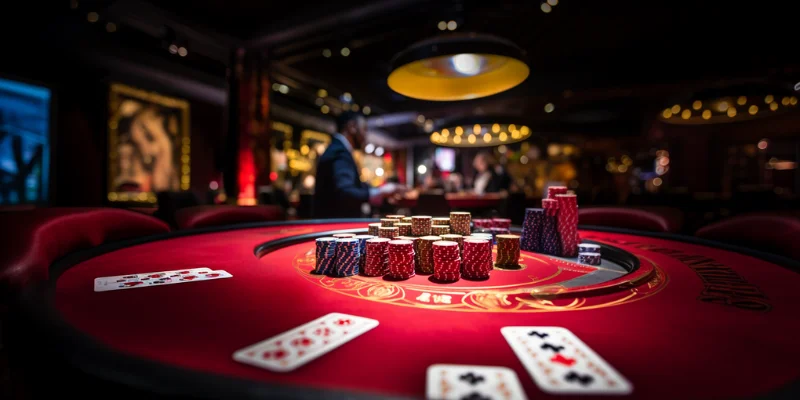Live poker is a thrilling and captivating game that has stood the test of time.
It brings together people from all walks of life, who share the common passion for this fascinating card game.
Whether you’re a beginner or a seasoned player, live poker offers endless opportunities for both entertainment and financial gains.
However, to truly excel in the game, it is essential to develop a winning mindset while keeping a responsible gaming mindset. This article will delve into the strategies and habits that can help you master live poker while ensuring responsible gaming practices.
Understanding Responsible Gaming
Before diving into the world of live poker, it is crucial to understand the concept of responsible gaming.
Responsible gaming refers to the practice of playing games, including poker, in a manner that is both enjoyable and safe. It involves maintaining control over one’s gambling behavior and making informed decisions to prevent it from becoming a problem.
Responsible gaming encompasses aspects such as setting limits, managing bankroll, and knowing when to take breaks.
 The Importance of Responsible Gaming in Live Poker
The Importance of Responsible Gaming in Live Poker
Responsible gaming is of utmost importance in live poker for several reasons.
Firstly, it helps maintain a healthy balance between the excitement of the game and the potential risks involved.
By setting limits and sticking to them, players can avoid chasing losses or getting carried away by winning streaks. Secondly, responsible gaming promotes a positive and enjoyable atmosphere at the poker table.
It ensures that all players are treated fairly and can have a good time without feeling pressured or overwhelmed. Lastly, responsible gaming helps protect players from the negative consequences of excessive gambling, such as financial strain or addiction.
Developing a Winning Mindset in Live Poker
To succeed in live poker, developing a winning mindset is crucial. This involves a combination of mental preparation, discipline, and self-belief.
One key aspect of a winning mindset is maintaining focus and concentration throughout the game. Live poker requires analyzing opponents, making quick decisions, and adapting strategies accordingly. By training the mind to stay focused, players can make better decisions and capitalize on opportunities.
Another important element of a winning mindset is managing emotions.
Poker can be an emotional rollercoaster, with highs and lows that can impact decision-making.
Successful players learn to control their emotions, avoiding tilt (reacting emotionally to losses) and remaining calm even during intense moments. This allows them to think clearly and make rational choices based on the game’s dynamics.
Lastly, having confidence in one’s abilities is paramount.
Believing in oneself and trusting the skills and knowledge acquired through practice and experience is essential for success in live poker. A winning mindset requires a positive attitude, resilience, and the ability to learn from mistakes.
 Essential Strategies for Success in Live Poker
Essential Strategies for Success in Live Poker
While live poker involves an element of luck, strategic play is what separates the winners from the rest. Here are some essential strategies to enhance your chances of success:
1. Starting Hand Selection – The foundation of a strong poker game lies in selecting the right starting hands. Understanding the value of different hands and their potential for improvement is key. Avoid playing weak hands and focus on starting with strong hands that have a higher probability of winning.
2. Positional Play – Position is crucial in poker, especially in live games. Playing from a late position provides a significant advantage as it allows you to gather more information about opponents’ decisions before making your own. Utilize positional play to maximize your chances of success.
3. Reading Opponents and Understanding Poker Tells – Live poker offers the unique advantage of being able to observe opponents’ behavior and physical cues. Learning to read these tells can give valuable insights into their hand strength and intentions. Look for patterns, changes in body language, and bet sizing to gain an edge over your opponents.
4. Mastering the Art of Bluffing – Bluffing is an essential skill in poker, but it must be used judiciously. Bluffing involves making opponents believe that you have a stronger hand than you actually do, forcing them to fold. Timing, observation, and understanding the dynamics of the game are key to successful bluffing.
5. Bankroll Management for Live Poker Players – Managing your bankroll is crucial to ensure your longevity in the game. Set aside a dedicated poker bankroll and establish limits for the stakes you play. Avoid chasing losses and never play with money you can’t afford to lose.
Reading Opponents and Understanding Poker Tells
In live poker, reading opponents and understanding poker tells can be a game-changer. While online poker relies heavily on betting patterns and timing, live poker offers the advantage of observing physical cues and behavior. By paying attention to your opponents’ actions, you can gain valuable insights into their hand strength and overall strategy.
One important aspect of reading opponents is observing their body language.
Look for changes in posture, facial expressions, or fidgeting, as these can indicate nervousness or confidence. When players are confident, they tend to sit upright, make direct eye contact, and display calmness.
Conversely, nervous players may fidget, avoid eye contact, or display signs of discomfort.
Bet sizing is another crucial factor to consider. The amount and timing of bets can reveal a lot about an opponent’s hand strength.
Large bets often indicate a strong hand, while smaller bets may suggest weakness or a draw. Pay attention to the consistency of bet sizing to identify patterns and exploit them to your advantage.
Poker tells can also manifest in verbal cues. Some players may involuntarily give away information through their choice of words or tone of voice.
Listen for any hints or contradictions in what they say, as this can provide valuable clues about their hand or intentions.
Mastering the art of reading opponents and understanding poker tells takes time and practice. As you gain experience, you will become more proficient at deciphering the subtle signals that can give you a competitive edge.
Mastering the Art of Bluffing in Live Poker
Bluffing is an integral part of poker, and mastering this skill can significantly enhance your chances of success.
A well-timed bluff can force opponents to fold stronger hands, allowing you to win pots without having the best cards. However, bluffing should be approached with caution and used selectively.
Timing is crucial when it comes to bluffing. It is essential to assess the table dynamics and your opponents’ tendencies before attempting a bluff.
Bluffing against loose, aggressive players may be less effective, as they are more likely to call or re-raise. On the other hand, bluffing against tight, cautious players may yield better results.
Observation is key to successful bluffing. Look for signs of weakness or indecision in your opponents’ actions. If they appear hesitant or check their cards repeatedly, it may indicate that their hand is not strong. Exploit these opportunities by making well-calculated bluffs that are consistent with the table dynamics such as Jili.
Another crucial aspect of bluffing is maintaining a consistent betting pattern.
If you suddenly increase your bet size significantly, it can raise suspicion and prompt opponents to call or re-raise. Bluffing should be done gradually and in a way that is consistent with your overall betting style.
Lastly, always be prepared to fold if your bluff is called. Bluffing is a high-risk, high-reward strategy, and there will be times when opponents see through your bluff. Accepting defeat gracefully and moving on to the next hand is an important part of maintaining a winning mindset.
 Practicing Responsible Gaming Habits in Live Poker
Practicing Responsible Gaming Habits in Live Poker
While the pursuit of success in live poker is exhilarating, it is essential to practice responsible gaming habits. Responsible gaming ensures that the game remains enjoyable and does not lead to negative consequences. Here are some habits to incorporate into your live poker routine:
1. Set Limits – Before sitting down at the poker table, determine your limits for both time and money. Decide how long you will play and how much you are willing to spend. Stick to these limits regardless of the outcome.
2. Take Breaks – Poker sessions can be mentally and emotionally draining. Taking regular breaks allows you to recharge and maintain focus. Use break time to relax, reflect on your gameplay, and avoid getting caught up in the intensity of the game.
3. Avoid Chasing Losses – Losing is an inevitable part of poker. Avoid the temptation to chase losses by making impulsive and irrational decisions. Stick to your strategy and accept that losses are a natural part of the game.
4. Seek Support if Needed – If you find yourself struggling with responsible gaming practices or experiencing negative consequences, it is important to seek support. Reach out to friends, family, or professional helplines that specialize in gambling addiction.
By incorporating these responsible gaming habits, you can ensure that your love for live poker remains a healthy and enjoyable pursuit.
Conclusion: Balancing Success and Responsible Gaming in Live Poker
In the world of live poker such as SA Gaming platform, success and responsible gaming go hand in hand.
While striving for victory and financial gains, it is essential to maintain a responsible gaming mindset.
By understanding the importance of responsible gaming, developing a winning mindset, and employing essential strategies, you can maximize your chances of success while safeguarding against the potential risks of excessive gambling same with app tài xỉu uy tín.
Remember, poker is not just a game of luck; it is a game of strategy, observation, and mental fortitude.
Embrace the challenge, enjoy the excitement, but always play responsibly.
With the right mindset and responsible gaming practices, you can become a master of live poker while keeping the game enjoyable and safe for yourself and others.
CTA: If you’re ready to put your skills to the test and experience the thrill of live poker, remember to always play responsibly. Set limits, manage your bankroll, and prioritize the enjoyment of the game. Good luck and may the cards be in your favor!
